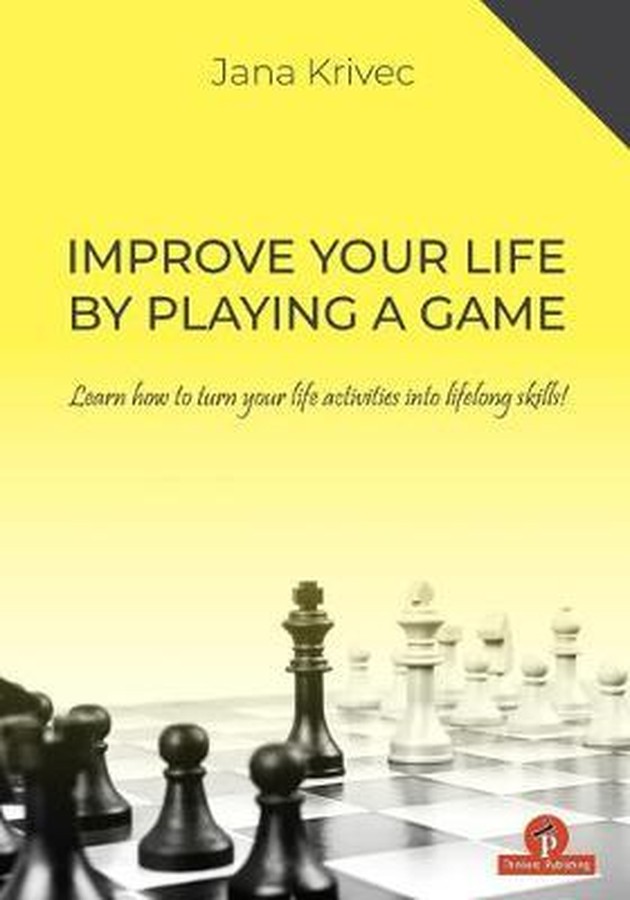| Utgivelsesdato | 2021 |
| Forfatter | |
| Pris | 425 NOK |
Improve Your Life by Playing a Game
En forbausende relevant, innholdsrik bok om avgjørende sider av hvordan bli bedre i sjakk, mye mer aktuell enn navnet på boka antyder. Blant annet er "a game" i denne boka i praksis "chess". Ypperlig også for sjakktrenere.
Innholdsfortegnelsen (lenger ned) antyder mye mer om det mangslungne og interessante som denne boka handler om.
Fra forordet av FIDE-mester og professor Matej Guid:
The process of acquiring chess skills and gaining a deep insight into the thinking of chess masters has always been an exciting topic. What are the special skills, talents and habits that distinguish great chess players from club players has long been the subject of intense discussion. Little scientific work has been devoted to this question, and there are practically no books that would combine knowledge of psychology and the development of strategic thinking skills in a textbook of high educational value.
The greatest obstacle was that most psychologists who dealt with this question were not strong chess players themselves and therefore had no direct access to the mental processes of chess at the master level. On the other hand, it is also difficult to find first-class cognitive psychologists among the chess players. Dr. Jana Krivec is a unique exception to this rule: a strong chess player, a woman grandmaster with extensive experience in competitive chess, and a university professor in the field of cognitive psychology, who devoted most of her research to understanding cognitive processes in the minds of chess players.
The book Improve Your Life by Playing a Game takes us on an exciting journey through a wide range of topics from psychology and explains these topics by putting the reader in the role of a tournament chess player. Gaining a deeper understanding of the mind of a chess player during training, playing and analyzing chess games suddenly takes on a different dimension when explained through the lens of modern psychology. Even non chess players can now deeply understand the famous quote that chess is life in miniature. Throughout the book life, chess and cognitive psychology are so intimately connected that the reader is given plenty of food for thought and valuable life lessons.
All this makes this book surprisingly interesting for a truly diverse audience including:
-
students of cognitive psychology who want to deepen their knowledge through case studies from real life
-
students of business administration and economics who want to develop and strengthen their strategic thinking skills
-
trainers and coaches in various sports (including chess, of course), who are aware that psychology plays a decisive role in every competition
-
chess players who want to improve their game by better understanding the role of psychology on their way to mastery.
Finally, we should not forget all those curious readers who are constantly searching for way to become true masters in the game of life.
Innholdsfortegnelsen:
017 1. Training
019 1.1 Goal setting
023 1.2 Motivation
029 1.3 Self examination and improvement
033 1.4 Discipline, hard work and persistence
037 1.5 Learning from the masters
041 1.6 Memorization techniques
047 1.7 Working with modern technology
049 1.8 Delayed reward
051 1.9 Never stop exploring
057 2. Playing a tournament
059 2.1 Preparation
063 2.2 During a chess game
123 3. After the game
125 3.1 Coping with stress and losses
145 4. After the tournament
147 4.1 A will to change
149 4.2 Who are you?
155 4.3 Mind and body work together
159 4.4 Positivity
161 4.5 Do what you like
162 4.6 Gens una sumus
165 5. Potential negative aspects of chess
167 6. Theories and studies on benefits of chess
167 6.1 Chess and education
172 6.2 Chess and health problems
183 Sources
189 About the author
| Innbundet? | Nei |
| Type | Bok |
| Språk | Engelsk |
| Antall sider | 192 |

